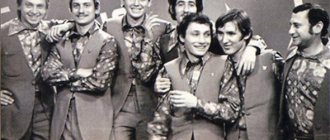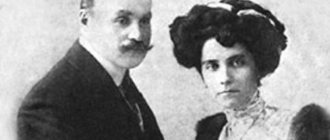Biography of the director
Vladimir Naumov was born in 1927. He was born in Leningrad. His father was closely connected with cinema, Naum Solomonovich worked as a cinematographer, by the way, he had a double surname - Naumov-Strazh. He worked in the films “Song of Spring”, “We are from Kronstadt”, “Night in September”.
Vladimir Naumov followed in his footsteps and in 1952 received a diploma from the directing department at VGIK. He studied in the creative workshop of Igor Savchenko.
His creative debut took place in Savchenko’s films “The Third Impact” and “Taras Shevchenko”, in which Vladimir Naumov served as an assistant director.
Biography
Naumov’s journey began when, on December 6, when he was born in 1927. Now the famous master is already a real elder; he recently celebrated his 89th birthday. My father himself was a cinematographer, this is Naum Solomonovich, known as Naumov the Guardian. Perhaps the family, his father’s work, initially became the impetus for Vladimir Naumovich’s choice of profession. After finishing school, the young man went to VGIK, immediately to the directing department there, where he became a student of the venerable Igor Savchenko, studying in the workshop. The student years, as usual, flew by quickly, and by 1952 he was already a graduate.
Naumov Vladimir Naumovich: photo
Subsequently, the first film in the biography of Vladimir Naumov, the aspiring director, was “The Third Impact,” where he was currently assisting his mentor, Savchenko. Next is Taras Shevchenko. The first jobs became an invaluable experience and time spent with a mentor. Soon, Igor Andreevich, alas, died, even when the filming work at “Taras Shevchenko” was not completed. Naumov had to finish it on his own. A. Alov helped yesterday's graduate. This is how their fruitful creative and business collaboration began.
Arriving at another Kyiv studio, founded by A. Dovzhenko, they already worked as a united team, next producing “Troubling Youth” together. This is a film based on the complete trilogy from V. Belyaev, the title is “The Old Fortress”. Next came “Pavel Korchagin”, it was based on N. Ostrovsky, his novel, namely “How the Steel Was Tempered”. This is real, revolutionary romance, when you feel the wind of change, the pictures are dynamic, full of drama, the characters change, and at the same time the world and their surroundings change. Of course, many were inspired by the fateful, tragic years of 1917-25, when the old collapsed and something new quickly appeared. 1957, already experienced directors, Vladimir Naumov and A. Alov moved to I. Pyryev when he invited him to work at the famous Mosfilm. Of course, the best thing for a director is to work and produce films. The creative process is filled with various problems, interesting solutions, and script development. And the reward is the recognition of the audience. They make the name of the director and his team recognizable and loved. Legendary directors can change history, like conquerors, only in the film industry.
For Vladimir Naumov, a professional, the year 1961 was fateful, when their common film, “Peace to the Entering One,” gained popularity, positive reviews, and then received several professional, prestigious awards, passing through international film festivals. It’s not surprising, because there the directors were able to connect the viewer closer and more fully with the characters shown. Not just cardboard models or faces are visible, the inner world is visible, pain or joy, tears or laughter are visible. When intertwined, the heroic is complemented with the ordinary, everyday. That the characters also cry or laugh and experience everyday, ordinary problems. How they change.
Naumov Vladimir Naumovich: personal photo
It is already known that any films are watched not only by spectators. There are critics whose reviews then provide a “summary” for the film. If they are positive, the film may be presented as a film festival entry.
1966 - the directors liked Dostoevsky's story. A separate film was soon made based on it, namely “A Bad Joke.” True, viewers saw the film later, in 1987, but initially they did not let it through; part of the film did not pass censorship.
Analyzing the biography of the director, Vladimir Naumov himself, I would like to remember his best, most recognizable work. This is “Running,” a film based on Bulgakov’s play. The eternal theme of the terrible, large-scale Civil War, which dozens of directors and screenwriters tried to reflect. The film feels tied to real, past history. It doesn’t just go in the background or as an off-screen thought. She plays, lives inside and around the characters. The heroes are eyewitnesses, victims of the thunderous war, experiencing difficult, turbulent revolutionary times. The directors managed to transport the viewer not to the offices of high officials, nor to show how power was divided or replaced. And to focus specifically on ordinary, ordinary people who were most affected by the tragedy.
“The Legend of Tila” was an experiment, a test of the pen to see if the directors could reflect something fantastic, and rework the ancient story into a close, modern interpretation.
The film “Tehran-43” generally became the favorite of the entire Soviet film distribution. It came out later, by 1980. Reflected the problem of responsibility, the problem of rethinking time. It is not surprising, because foreign, well-known actors of that time were invited to the filming, these were Kurd Yurgens, then Alain Delon, symbols of cinema. A film like this turned into a real breakthrough when Soviet cinema interacted with foreign, famous actors. This alliance turned out to be extremely successful, Tehran-43 is the best proof. Rather, audience attention, love and critical acclaim.
Naumov Vladimir Naumovich at the presentation
Soon A. Alov, his friend and colleague, died. After this, the biography of Vladimir Naumov himself as a director was replenished with the films “Choice”, then “The Law”, then “Ten Years Without the Right of Correspondence” was released. Then Naumov wrote a separate script together with the famous Tonino Guerra, dedicating it to Marcello Mastroianni, although he soon fell ill. I had to replace him with Innokenty Smoktunovsky, also a legend, but Soviet. The picture, the result of labor, “White Holiday” was completed and came out later, when Smoktunovsky had already died.
Along with filming, selecting scripts, and writing them, Naumov grew as a professional.
1963 - formerly an ordinary director, he later headed Mosfilm, then became a teacher, sharing his accumulated experience and best practices himself with the new, younger generation. He taught separate Higher Directing courses.
1976 - he is the secretary of the board of the USSR Investigative Committee.
1980 was Naumov’s first year as head of VGIK.
1986 - full-fledged professor, leading his own workshop for directing feature films. This is work at the All-Russian Institute, where specialists were helped to retrain and improve their skills.
1987 – General Director for Soyuz Navona.
2002 - when Vladimir Naumov, already the president, and the first, from the National Academy, dedicated specifically to cinematic science. Further, a full member of the European Film Academy, at the same time the secretary of the Union of All Cinematographers of Russia. At the same time, he is a member of the board of the Mosfilm film concern.
Naumov managed not only to show himself, but to develop as a talented, experienced director or screenwriter. He was able to be a good mentor, a visionary leader, even a strategist. Vladimir Naumovich tried to look deeper, broader and forward, he saw how cinematography should develop, where to go. Hence the cooperation, the involvement of foreign actors, diverse films that added to the treasury of favorite films among the Soviet and then Russian audiences.
Of course, the years of work occurred during difficult, rapidly changing times. Worth remembering. First, the 60s, the beginning of a career. Calm, established times, Brezhnev's rule, the USSR is strong. Then the 80s were difficult, perestroika times. The 90s, when a huge, great country was collapsing around us, enterprises were falling apart.
Naumov continued to work, he understood how great the importance of good, high-quality paintings was then. After all, they inspired people, motivated them, and captivated them with the story. Finally, the years after independence. The country had to literally pick up the pieces, and Vladimir Naumovich was already a big boss, responsible for the fate and development of Mosfilm.
Creative debut
In 1950, Savchenko died suddenly, Naumov, together with Alexander Alov, completed the film “Taras Shevchenko,” which was released in 1951.
Then, together with Alov, the hero of our article directs another film. This is the painting “Anxious Youth” based on Belyaev’s novel “The Old Fortress”. In 1956, they released a film adaptation of Ostrovsky’s novel “How the Steel Was Tempered” under the title “Pavel Korchagin”.
The action of this picture is transferred to the 30s. Already terminally ill, Korchagin, who is bedridden, recalls his military youth, talks about the revolution, life's hardships and difficulties, even losing his sight, strives to finish work on the book of his memoirs.
This work was awarded a silver medal at the World Festival of Youth and Students and an incentive diploma at the All-Union Film Festival.
In 1957, young directors came to work for Mosfilm at the invitation of the famous Ivan Pyryev.
Career
After graduating from VGIK, Vladimir Naumov simply burst into the world of cinematography.
By this time, he was already familiar not only with Igor Savchenko, but on the set he also managed to meet Alexander Alov, whose union brought him creative fame and success. In 1957, Naumov became a director at the famous Mosfilm film studio. One day, on the set of his next film, Igor Savchenko became ill. After his death, Vladimir Naumovich and Alexander Alov headed the filming, and the film was nevertheless released.
The success of this picture led to the fact that Naumov was chosen as the head of the Soyuz studio. The film “How the Steel Was Tempered” brought unprecedented fame to the young director. And the film “The World Entering” brought the film director worldwide popularity and many awards. But his films did not always pass censorship.
Thus, the film “Bad Anecdote”, shot by the director based on the novel by F. M. Dostoevsky, where Evstigneev played the main role, was not released into cinemas due to anti-Soviet propaganda. The film gathered dust on the shelves for a long time, and audiences were able to see it only in 1987.
Since 1986, Naumov became a professor and head of the VGIK workshop. He made many films: “Running”, “Tehran 43”, “Choice” and other brilliant films.
In 2001, the director released a new film, “Clocks Without Hands,” which was a huge success. In some films, Vladimir Naumovich showed himself not only as a director, but also as a wonderful actor. He starred in many films. For example, “Shine, burn, my star”, “Theft”, etc.
Another creative ability in the director’s work is also known, which also brought him success. In 1958, he decided to try himself as a screenwriter, and it turned out that this work could be exciting, interesting and successful. To date, scripts have already been written for 18 films that have become popular.
In the mid-90s, Vladimir Naumovich decided to try himself as a producer. More than 10 films were published, in which Naumov became a producer. One of the paintings, “Year of the Horse: Constellation Scorpio,” belongs to his daughter Natalya.
Vladimir Naumovich has many awards. So, he is People's Artist of the Russian Federation, People's Artist of the USSR, laureate of the USSR State Prize.
Participation in the Venice Film Festival
The real success of director Vladimir Naumov was the drama “Peace to the Enterer,” on which he also worked with Alov. Starring Alexander Demyanenko, Viktor Avdyushko, Nikolai Grinko.
At the center of the film is Junior Lieutenant Ivlev, who has just graduated from college. He goes to Berlin a few days before the complete surrender of Germany in the Great Patriotic War. In a destroyed city, he meets a pregnant German woman, whom he helps get to the hospital. Next, he will have to accompany the shell-shocked soldier to the rear. Thus, older and more experienced officers want to protect him from accidental death in the last days of the war. A pregnant German woman is also traveling with Ivlev. Their path, in its complexity and thorns, immediately resembles Homer's Odyssey.
By the end of the journey, the main character arrives matured and matured. The end of the war coincides with the celebration of the birth of the baby. In the final scene, a newborn baby pees on a now-unnecessary weapon.
The film was awarded at the Venice International Film Festival. The film received a special jury award.
"The Legend of Tila"
The most important thing in the union of two like-minded people was the desire to create cinema for everyone, but not ordinary films and film adaptations, and in each new film the personality of the directors themselves was revealed more and more. “The Legend of Tila” was filmed for the first time; before Naumov, no one thought about the most interesting storyline of the great work. Young people appreciated this picture, and the film became very popular. The older generation, who remembered the revolutionary patriotic films of Alov and Naumov, reacted to the film more coolly and accused the directors of flirting with the West and creating non-Soviet, ideologically consistent films, but this did not in any way affect the creative plans, because Tehran-43 was already ahead. Vladimir Naumov, whose biography is rich in interesting and significant achievements, worked on the film with special interest; he was already an experienced director, and he wanted innovative ideas and an original approach to a well-known topic.
Censorship bans
In 1962, Naumov filmed a series of short stories “Coin” based on the stories of the American writer Albert Maltz, and in 1966, difficult times came in the biography of Vladimir Naumov. His new film, also co-written with Alov, was banned for censorship reasons.
This is a tragicomedy called “A Bad Joke”, based on the story of the same name by Fyodor Dostoevsky. The story about a St. Petersburg official who decided that the success of state reform depended solely on his personal qualities and humanity was not approved by the censors. In fact, this marked the end of the Thaw and the beginning of the Brezhnev era. The film was released only in 1987.
Naumov, Vladimir Naumovich
Born on December 6, 1927 in Leningrad (now St. Petersburg) in the family of cinematographer Naum Solomonovich Naumov-Strazh (1898-1957) and actress Agnia Vasilyevna Burmistrova (1906-1971).
In 1951, he graduated from the directing department of the All-Union State Institute of Cinematography (VGIK; now the All-Russian State Institute of Cinematography named after S. A. Gerasimov) in Moscow, where he studied in the workshop of Igor Savchenko. During his student years, he was his assistant on the set of the film “The Third Impact” (1948), in which he also made his debut as a film actor.
After the death of the head of the workshop, together with director Alexander Alov, he completed Igor Savchenko’s film “Taras Shevchenko” (1951). From that moment on, the creative collaboration between Naumov and Alov began. Among their first joint works are “Anxious Youth” based on Vladimir Belyaev’s trilogy “The Old Fortress” (1954), “Pavel Korchagin” based on Nikolai Ostrovsky’s novel “How the Steel Was Tempered” (1956), “Wind” (1958). In 1961, the war drama “Peace to the Entrant” was released, which was then awarded a special jury prize at the XXII Venice International Film Festival for best director’s work and the Pasinetti Cup award (a prize from Italian film critics for the best foreign film). In 1962, in Brussels, the film received the national Belgian film award “Femina”. In 1966, directors filmed Fyodor Dostoevsky's story “A Bad Joke.” However, the picture drew criticism from officials. Naumov and Alov were accused of “exaggerating the colors”, of “distorting Dostoevsky’s ideas”, etc. According to the memoirs of Vladimir Naumov, the head of Goskino Alexey Romanov told the directors that because of them he could “lose his party card.” As a result, the film was banned from screening and was released only in 1987. Among other joint films of Vladimir Naumov and Alexander Alov: “Running” based on the works of Mikhail Bulgakov (1970), “The Legend of Thiel” based on the novel by Charles De Coster “ The Legend of Ulenspiegel" (1976), "Tehran-43" (1980, USSR - Switzerland - France), "The Shore" based on the novel by Yuri Bondarev (1983, USSR - Germany). In 1971, they also acted as theater directors, staging the play “Toot, Others and the Major” based on the play by Istvan Erken at the Moscow Sovremennik Theater. After the death of his colleague in 1983, Vladimir Naumov made the documentary film “Alov” (1985) dedicated to him. He also continued his work as a director in feature films, making films: “Choice” based on the work of Yuri Bondarev (1987), “The Law” (1989), “Ten Years Without the Right of Correspondence” (1990), “White Holiday” based on the story by Tonino Guerra “ One Hundred Birds" (1994), "Clock Without Hands" (2001), "Mona Lisa on the Asphalt" (2007). In 2012, Vladimir Naumov began filming the film “The Tale of Tsar Saltan.” It was planned that it would become the first in the film cycle “Pushkin's Tales”. However, due to lack of funds, its production was not completed. Vladimir Naumov shot most of his films from his own scripts (in total, he wrote scripts for 18 films). Several times Vladimir Naumov acted as a film actor. After a small role as a lieutenant in the film “The Third Strike,” he played a staff captain in Alexander Mitta’s tragicomedy “Shine, Shine My Star” (1969), and a police colonel in Alexander Gordon’s television film “Theft” (1970). Subsequently, he acted only in his own films (“Clock without hands”, “Mona Lisa on the asphalt”). In 1963, Vladimir Naumov became the artistic director of the creative association of writers and film workers created at the Mosfilm film studio. After its transformation into cinema, he took over as its general director. Since 1976, he was also the secretary of the board of the Union of Cinematographers of the USSR. Since 1980 he led a workshop at VGIK. Professor (1986). In the 2010s. Together with his wife, the famous Russian actress Natalia Belokhvostikova, he led an acting and directing workshop at the Moscow School of New Cinema. In 2004, Vladimir Naumov worked as a producer on the film “Year of the Horse. Constellation Scorpio", directed by his daughter Natalya.
President of the National Academy of Motion Picture Arts and Sciences of Russia. Member of the Union of Cinematographers of the Russian Federation and the European Film Academy.
Honored Artist of the RSFSR (1965). People's Artist of the USSR (1983).
Vladimir Naumov was awarded the Order of the Badge of Honor (1971), the Red Banner of Labor (1977), Friendship of Peoples (1987), “For Services to the Fatherland” II, III and IV degrees (2007, 2020, 1997), Honor (2013). Laureate of the USSR State Prize in the field of literature, art and architecture (1985, for the film “The Shore”).
Winner of the Golden Eagle film award in the honorary nomination “For outstanding contribution to world cinema” (2008). Honorary member of the Russian Academy of Arts.
Author of the book “In the Frame” (2000, co-authored with Natalia Belokhvostikova).
Vladimir Naumov is married for the second time. His wife is People's Artist of the RSFSR Natalia Belokhvostikova (born 1951). Their daughter Natalia Naumova (born 1974), starred in the film “Tehran-43” as a child. Subsequently, she graduated from the acting department of VGIK and the Higher Courses for Scriptwriters and Directors, starred in her father’s films, but chose a career as a director. In 2007, Vladimir Naumov and Natalia Belokhvostikova adopted a boy, Kirill (born 2004). The director's first wife was Honored Artist of the RSFSR Elsa Lezhdei (1933-2001). From his marriage to her there is a son, Alexey (born 1962, artist).
Best works
One of the most famous films of Vladimir Naumov is the film novel “Running”. Together with Alov, the hero of our article staged it based on the play of the same name by Mikhail Bulgakov.
The film tells about the last months of the Civil War in Russia. The action takes place in the south of the country.
In 1976, The Legend of Tila was released. These are two full-length films, united by one theme - “The Ashes of Klaas” and “Long Live the Beggars.” The film is dedicated to the medieval hero of German and Dutch legends Till Eulenspiegel.
The suffering of the Dutch people in the 16th century is clearly shown, as they suffer from high taxes, cruel decrees, the Inquisition, and begin a war of liberation against Spanish rule.
In 1980, Alov and Naumov released another high-profile premiere - the political detective story Tehran-43. The film instantly becomes one of the leaders in Soviet box office. The cast played a big role in this. In addition to famous Soviet artists (Armen Dzhagarkhanyan, Natalia Belokhvostikova, Gleb Strizhenov), French cinema stars also star in the film. First of all, all attention is focused on the sex symbol of the 80s, Alain Delon.
Success is also ensured by a fascinating plot - on the instructions of Hitler and his entourage, a group of terrorists infiltrates Tehran on the eve of important international negotiations between the leaders of the three powers. Soviet intelligence officers were tasked with ensuring the security of the Tehran Conference and preventing the negotiations from breaking down.
Filmography[edit | edit code]
Actor[edit | edit code]
- 1948 - Third Strike - young lieutenant
- 1969 - Shine, burn, my star - staff captain
- 1970 - Theft - Abalin
- 2001 - Clock without hands - episode
- 2007 - Gioconda on the asphalt - “mother”
Director[edit | edit code]
- 1951 - Taras Shevchenko (finished after the death of I. Savchenko) (jointly with A. A. Alov)
- 1954 - Anxious youth (together with A. A. Alov)
- 1956 - Pavel Korchagin (together with A. A. Alov)
- 1958 - Wind (together with A. A. Alov)
- 1961 - Peace to the one who enters (together with A. A. Alov)
- 1962 - Coin (together with A. A. Alov)
- 1966 - Bad joke (together with A. A. Alov)
- 1970 - Running (together with A. A. Alov)
- 1976 - The Legend of Tila (together with A. A. Alov)
- 1980 - Tehran-43 (together with A. A. Alov)
- 1983 - Shore (together with A. A. Alov)
- 1985 - Alov (documentary)
- 1987 - Choice
- 1989 - Law
- 1990 - Ten years without the right to correspondence
- 1994 - White Holiday
- 2001 - Clock without hands (“The Dream of a White Dog” or “The Secret of Nardo”)
- 2007 - Gioconda on the asphalt
- 2014 - The Tale of Tsar Saltan (was not completed) (together with N.V. Naumova)[18]
Screenwriter[edit | edit code]
- 1958 - Wind (together with A. A. Alov)
- 1961 - Peace to the one who enters (together with A. A. Alov, L. G. Zorin)
- 1962 - Coin (together with A. A. Alov)
- 1966 - Bad joke (together with A. A. Alov, L. G. Zorin)
- 1970 - Running (together with A. A. Alov)
- 1972 - Carnival (together with A. A. Alov)
- 1973 - How steel was hardened (together with A. A. Alov)
- 1976 - The Legend of Tila (together with A. A. Alov)
- 1980 - Tehran-43 (together with A. A. Alov, M. F. Shatrov)
- 1982 - The Adventures of Count Nevzorov (together with A. A. Alov)
- 1983 - Shore (together with A. A. Alov, Yu. V. Bondarev)
- 1985 - Alov (documentary)
- 1987 - Choice (together with Yu. V. Bondarev)
- 1989 - Law (jointly with A. A. Alov, L. G. Zorin)
- 1990 - Ten years without the right of correspondence (together with A. A. Kabakov)
- 1994 - White Holiday (together with T. Guerra)
- 2001 — Clock without hands (together with G. I. Kushnir, T. Guerra)
- 2007 - Gioconda on the asphalt (together with T. Guerra)
- 2010 — It’s snowing in Russia (was not completed)
Producer[edit | edit code]
- 1994 - White Holiday
- 2001 — Clock without hands
- 2004 - Year of the Horse: Scorpio Constellation
- 2007 - Gioconda on the asphalt
- 2010 — It’s snowing in Russia (was not completed)
Participation in films[edit | edit code]
- 1984 - I will teach you to dream... (documentary)
- 1985 - Alov (documentary)
- 1996 - Nikolai Grinko (from the series of TV programs on the ORT channel “To Remember”) (documentary)
- 1996 - Stanislav Khitrov (from the series of TV programs on the ORT channel “To Remember”) (documentary)
- 1998 - Vladislav Dvorzhetsky (from the series of TV programs on the ORT channel “To Remember”) (documentary)
- 2005 - Gottlieb Roninson (from the series of programs on the DTV channel “How the idols left”) (documentary)
- 2005 - Yuri Ozerov (from the series of programs on the DTV channel “How the idols left”) (documentary)
- 2006 - Dvorzhetskys (from the series of programs of the DTV channel “How the idols left”) (documentary)
- 2007 - 50th: Ivan Pyryev. Ivan the Builder (from a series of documentaries made for the 100th anniversary of Russian film production “The History of Film Bosses, or Builders and Perestroika”)
- 2007 - Mikhail Ulyanov. The Man Who Was Believed (documentary)
- 2008 - Alexey Batalov. Our dear man (documentary)
- 2008 - Vasily Lanovoy. There is such a profession... (documentary)
- 2008 — Vladimir Basov (from the documentary series about the masters of Russian cinema “Man in the Frame”
- 2009 — Viktor Sergachev (from the documentary series about the masters of Russian cinema “Man in the Frame”
- 2009 - Boris Shcherbakov. Who visits in the morning (documentary)
- 2009 - Nikolay Grinko. The main pope of the USSR (documentary)
- 2010 - Alain Delon. A man for all seasons (documentary)
- 2010 - Catherine III (documentary)
- 2010 - And the moment is filled with eternity... (documentary)
- 2010 - Innokenty Smoktunovsky. My last name won’t tell you anything... (documentary)
- 2010 - Lyudmila Savelyeva. After the ball (documentary)
Work after Alov's death
In 1983, Naumov’s constant partner, Alexander Alov, died at the age of 59. After this, Naumov works alone.
In 1987, he filmed the drama “Choice” about a Soviet artist who, at an exhibition in Italy, meets his front-line friend who dreams of returning to his homeland. In 1989, the historical drama “The Law” was released about the beginning of the process of rehabilitation of political prisoners in the mid-50s after the death of Joseph Stalin.
In 1990, with the support of filmmakers from Germany, the political drama Ten Years Without the Right of Correspondence was released.
In the 90s, Naumov no longer worked so actively. Only a few of his films are being released - “White Holiday”, “Clock without Hands”, “Mona Lisa on the Asphalt”, “Tales of Tsar Saltan”.
In several of these films he also appears as an actor. In general, he played his most famous roles in Alexander Mitta’s tragicomedy “Shine, Shine, My Star,” where he played the role of a staff captain, and the psychological detective story “Theft” by Alexander Gordon.
Movies
The creative biography of Vladimir Naumov actually already began during his studies. Even during his student years, Vladimir Naumov assisted his teacher in the films “The Third Impact” and “Taras Shevchenko”. During the filming of the last film, director Igor Savchenko’s heart suddenly stopped, and Naumov completed the film together with classmate Alexander Alov. This tandem will delight viewers with wonderful works for many years to come.
Alexander Alov and Vladimir Naumov
After graduation, both aspiring directors received assignments to Kyiv at the A. Dovzhenko Film Studio, where they immediately staged the adventure film “Troubling Youth” based on Vladimir Belyaev’s trilogy “The Old Fortress”. The next work was again a film adaptation of the famous book: the historical-revolutionary drama “Pavel Korchagin” was based on Nikolai Ostrovsky’s novel “How the Steel Was Tempered.” Both of these films were expected to be a great success.
In 1957, Naumov and Alova were invited to a Moscow film studio. The very first film at Mosfilm, the war drama “Peace to the Entering One,” became a prize-winner at several international film festivals. But not all of their collaborations were approved by the government. For example, the comedy “A Bad Joke” based on the story of the same name by Fyodor Dostoevsky was at one time rejected by censorship due to too strong satire and appeared on screens only 20 years later.
The most successful films of the creative duo of directors are considered to be the film novel “Running” and the detective story “Tehran-43”. In these films, the masters involved not only domestic screen stars, for example, Alexei Batalov, Evgeny Evstigneev, Mikhail Ulyanov, but also foreign artists - Alain Delon and Kurd Yurgens.
Vladimir Naumov and Alain Delon on the set of the film “Tehran-43”
After Alexander Alov died, Vladimir Naumov began to work alone. And first of all, he made the documentary “Alov” about his respected partner and good friend. Then, until the end of the 80s, such films as “Choice”, “The Law”, “Ten Years Without the Right of Correspondence” were released.
In the first years after the collapse of the Soviet Union, the director made the drama “White Holiday” from his own script. Initially, he planned to star the legendary Italian Marcello Mastroianni in the title role, but then replaced him with the equally wonderful actor Innokenty Smoktunovsky, for whom this film became the final point in his career.
By the way, the director began making another film with Mastroianni, “The Secret of Marcello,” but due to the actor’s death, the film was not finished.
Vladimir Naumov on the set of the film “Choice”
Vladimir Naumov also pays great attention to teaching and educational activities, as well as the organizational part of work in cinema, cultural and social spheres. Since 1963, Vladimir Naumov has held the post of head of the Creative Association of the Mosfilm film studio. Since 1976, the director worked as secretary of the board of the USSR Investigative Committee.
Vladimir Naumovich also taught at the Higher Directing Courses. Since 1980, the famous director has headed the VGIK workshop, and six years after receiving leadership of the workshop, Vladimir Naumov became a professor in his own discipline and continued teaching at a new level.
In addition, Vladimir Naumov conducts a workshop on directing feature films at the All-Russian Institute for Retraining and Advanced Training of Cinematograph Workers of the State Cinematography of Russia.
Vladimir Naumov on the set of the film “Tales of Pushkin. The Tale of Tsar Saltan"
In 2002, Vladimir Naumov took over as the first president of the National Academy of Motion Picture Sciences and Arts.
In the 21st century, Vladimir Naumov directed the detective story “A Clock Without Hands”, the melodrama “Gioconda on the Asphalt”, and in 2012 the director began working with his daughter on the children’s film “Fairy Tales of Pushkin. The Tale of Tsar Saltan".
Family life
The personal life and biography of Vladimir Naumov has always been of interest to his many fans. He was married twice. His first chosen one was actress Elsa Lejay, with whom he had a son, Alexei, in 1962. Now the grandson Vladimir Naumov Jr. is a famous playwright. But the couple was not happy. In 1962 they separated.
Vladimir Naumov’s personal life was happy with actress Natalya Belokhvostikova, whom he married in 1974. Two years later, their daughter Natalya was born, who became an actress and film director. The couple also raised an adopted son named Kirill.
Now Naumov has retired; he is 90 years old.
[edit] Personal life and family connections
His family connections are described as follows:
First wife (until 1964) - Elsa Ivanovna Lezhdei (February 19, 1933 - June 12, 2001), actress. Honored Artist of the RSFSR (1974). Son - Alexey Vladimirovich Naumov (born 1960). Grandson - Vladimir Alekseevich Naumov Jr., playwright. Second wife (since 1974) - Natalia Nikolaevna Belokhvostikova (born 1951), film actress. People's Artist of the RSFSR (1984). Daughter - Natalya Naumova (born 1976), film director, film actress. Adopted son - Kirill Belokhvostikov.











